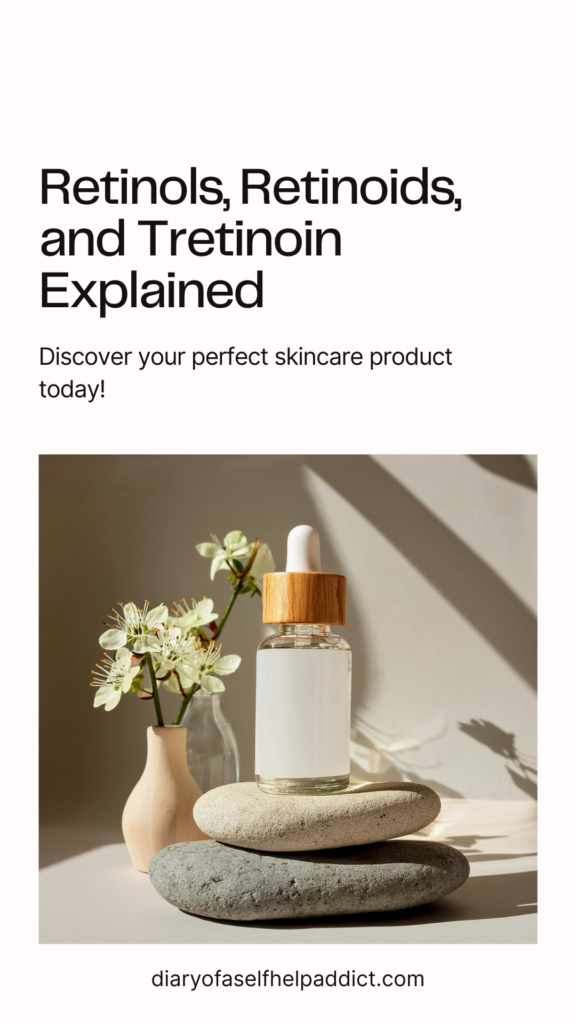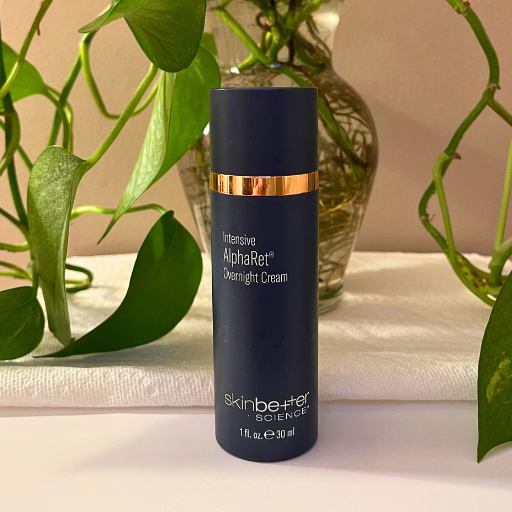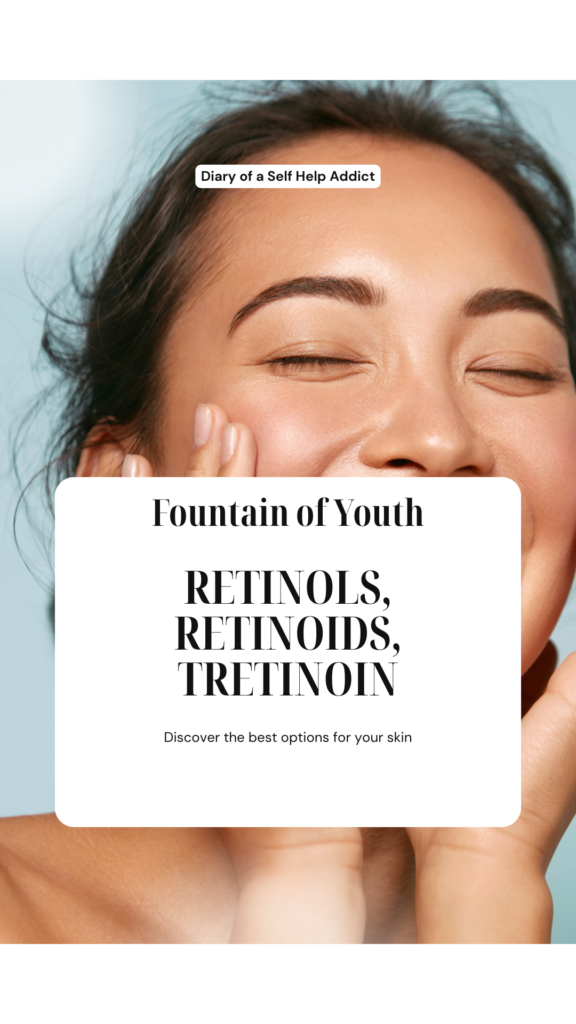
If you’ve dipped a toe (or your entire face) into the world of anti-aging skincare, chances are you’ve heard the words retinol, retinoids, Retin-A, and tretinoin. These vitamin A derivatives are the gold standard in skincare for a reason—but they also have a reputation for being harsh, drying, and a bit confusing.
As someone who’s tried them over the years, I can confirm that they work. But they can also wreak havoc on your skin, especially if you have sensitive skin like mine. Every time I started a retinoid regimen, I’d get excited, apply as directed, and then—without fail—deal with red, flaky, Sahara-dry skin that made me want to give up. So I did… again and again.
That is until I found SkinBetter Science’s AlphaRet Overnight Cream. This product has completely changed my skin and my relationship with retinoids. If you’ve struggled like I did, read on—I’m diving into the science behind these powerhouse ingredients, how they differ, their benefits, and why AlphaRet might be the answer you’ve been searching for.
Related Read: TWO CHANGES THAT TRANSFORMED MY AGING SKIN AT 52 (AFTER DECADES OF IGNORING SKINCARE)
What Are Retinoids?
“Retinoid” is the umbrella term for all vitamin A derivatives used in skincare. These ingredients speed up cell turnover, stimulate collagen production, improve skin texture, fade hyperpigmentation, and fight acne. Retinoids can be prescribed or over-the-counter and vary in strength.
Retinoids include:
- Retinol – Available over the counter, retinol is one of the gentlest forms. It requires conversion in the skin to become active, which slows down the process but reduces irritation.
- Retinaldehyde (Retinal) – Slightly stronger than retinol, also OTC, and needs only one conversion step to become active.
- Tretinoin (Retinoic Acid) – Prescription-only and does not require conversion. This active form of vitamin A works fast—but can be irritating.
- Retin-A – A brand name for tretinoin.
- Adapalene (Differin) – A synthetic retinoid originally prescription-only but now available OTC in lower strengths. Often used for acne.
- Tazarotene – A potent prescription retinoid typically used for acne and psoriasis.
Key Differences Between Retinols, Retinoids, Retin-A, and Tretinoin
| Product | Strength | Prescription? | Irritation Level | Best For |
|---|---|---|---|---|
| Retinol | Low | No | Mild | Beginners, sensitive skin |
| Retinaldehyde | Medium | No | Moderate | Faster results than retinol |
| Tretinoin/Retin-A | High | Yes | High | Acne, aging, texture issues |
| Adapalene (Differin) | Medium | OTC (0.1%), Rx (0.3%) | Moderate | Acne-prone skin |
| Tazarotene | Very High | Yes | Very High | Acne, psoriasis, wrinkles |
| AlphaRet (Lactic Acid + Retinoid) | Medium | No (sold through professionals) | Low | Anti-aging, sensitive skin |
The Benefits of Using Retinoids
Retinoids offer a long list of skin benefits:
- Stimulate collagen production – Helping reduce the appearance of fine lines and wrinkles.
- Improve cell turnover – This leads to smoother texture and a more even tone.
- Treat acne – Unclog pores, reduce oiliness and prevent breakouts.
- Fade hyperpigmentation – Including sun spots, melasma, and post-acne marks.
- Refine pores – Making them appear smaller.
- Prevent future signs of aging – Consistent use yields cumulative benefits.
Common Side Effects and Contraindications
Despite the incredible results, retinoids are not without their drawbacks. If misused, they can cause:
- Dryness
- Flaking
- Redness
- Irritation
- Purging (temporary breakouts)
Retinoids should be avoided or used with caution if:
- You’re pregnant or breastfeeding (most are contraindicated).
- You have rosacea, eczema, or severely sensitive skin (check with a dermatologist).
- You’re using other active ingredients like AHAs, BHAs, or benzoyl peroxide without professional guidance.
How to Start Using Retinoids (Without Hating Your Face)
If you’re starting fresh with retinoids or returning after a break, here’s the general advice for beginners:
- Start with a lower concentration – Begin with OTC retinol (0.25%) before moving up.
- Apply only at night – Retinoids degrade in sunlight, making your skin more UV-sensitive.
- Use the sandwich method – Apply moisturizer before and after retinoid to buffer irritation.
- Apply 2–3 nights per week – Gradually increase frequency as your skin adjusts.
- Avoid other actives at first – Don’t mix with acids, vitamin C, or exfoliants until your skin adjusts.
- ALWAYS wear sunscreen – This is non-negotiable when using retinoids.
My Personal Experience: Why I Almost Gave Up on Retinoids
Over the years, I’ve tried:
- OTC retinol creams and serums
- Prescription Retin-A (tretinoin)
- Retinoid creams prescribed for adult acne
And every single time, I gave up. I followed all the rules—started slowly, moisturized heavily, avoided harsh actives—but still experienced intense dryness, red patches, and flaking that made me dread looking in the mirror.
This was discouraging for someone who loves skincare and healthy aging. Although I knew the science behind these ingredients, my skin just didn’t tolerate them.
I’d resigned myself to being someone who just couldn’t use retinoids—until I discovered SkinBetter Science’s AlphaRet Overnight Cream.
The Game-Changer: AlphaRet Overnight Cream

AlphaRet is a unique combination of a retinoid, lactic acid, and a gentle exfoliating AHA that hydrates. Sounds like it would be irritating, right? But here’s the magic—it’s not.
This formula uses an encapsulated retinoid that slowly releases over time and combines it with ingredients that nourish and calm the skin. It includes:
- AlphaRet – A combo of Retinoid & Lactic Acid, which exfoliates while hydrating.
- Glycolic acid – Improves texture and the performance of AlphaRet.
- Peptide Blend – Improves skin firmness & wrinkles.
- Niacinamide, Squalene, Hyaluronic Acid – Calms redness and supports barrier health & hydration.
- Green Tea Extract Blend – Reduces redness & hyperpigmentation.
- Vitamin C, E & CoQ 10 – Antioxidants that fight environmental damage.
Related Read: BIOREPEEL: THE REVOLUTIONARY CHEMICAL PEEL THAT WORKS WONDERS
Why It Worked for Me
After a few nights of use, my skin felt hydrated, not stripped. I noticed:
- Smoother skin texture
- No flaking or peeling
- Less redness
- Brighter skin tone
And the best part? I actually wanted to keep using it. AlphaRet made retinoid use sustainable for me. I no longer have to choose between anti-aging results and healthy skin.
Is AlphaRet Right for You?
If you:
- Have sensitive skin
- Are prone to dryness or flaking
- Have tried tretinoin and have given up
- Want visible results without the side effects
Then yes—this product is absolutely worth trying. It’s sold through professionals and select online retailers (like my med spa, KL Aesthetics and Wellness, LLC), so it’s not found on Amazon or in drugstores. But it’s worth every penny in my book.
Kelly’s Thoughts: Don’t Give Up on Retinoids Just Yet
If your skin hasn’t tolerated retinoids in the past, you’re not alone. I’ve been there more times than I can count. But advancements in formulation—like what SkinBetter Science has done with AlphaRet—are changing the game.
You don’t have to suffer through peeling and irritation to get the benefits of retinoids. There is a way to age gracefully, gently, and confidently.
If you’re ready to try again, I’d be happy to help you get started with AlphaRet or find the proper routine for your skin type. Let’s finally get you glowing—without the redness.
Want to try AlphaRet? Feel free to reach out via Instagram @KL_Aesthetics_Wellness or DM me on Facebook! I would love to help you find the right products for your skin goals.
If you’ve had a similar experience with retinoids, I’d love to hear from you—what has worked for you and what hasn’t? Share in the comments below.
DISCLAIMER: THIS IS NOT MEDICAL ADVICE. IT IS FOR INFORMATIONAL PURPOSES ONLY. FOR THE FULL PRIVACY POLICY, CLICK HERE.
Pin it for later


Love this guide. It’s hard to figure a good skincare routine out. Thanks!
This is a wealth of information!